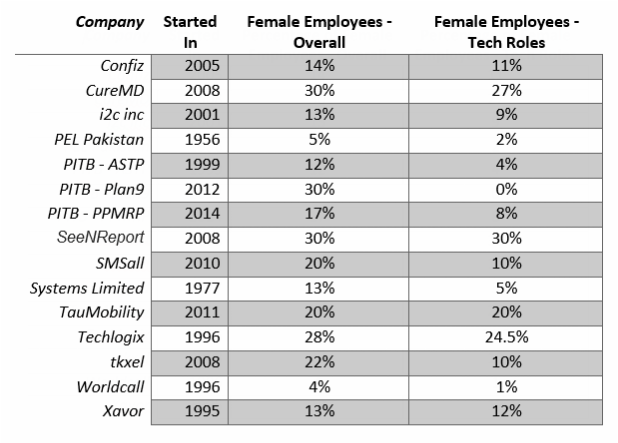 By Dr. Bushra Anjum, Global Tech Leader Gone are the days when teachers and doctors were considered the only “appropriate” professions for females, even in a relatively conservative land like Pakistan. Pakistan, my home land, my country, still faces the challenges of defining the boundaries of traditions and modernism, holding to one’s roots yet keeping abreast with the world. Still, slowly but surely the country is moving forward with women rights, roles and responsibilities, thanks to a relatively open media, an aggressive section of the civil society and increasing awareness of women rights (religious and societal). Having both studied from and taught at the leading CS institutes in Pakistan, I can state that the percentage of women engineers, especially those in CS, is currently around 18% of the total student population. From the days when I was a student (2005) to today, there is a visible shift in female graduates’ preference to gain industry experience after finishing the degree. In 2005 hardly 10% of the female graduates actively sought an industry position, now, it is certainly over 65% and the trend is improving. Since this interest towards CS industry is relatively new, I don’t consider we are in a position to evaluate senior women/leader/board positions. We need to give it another generation to see how far they reach. However, a lot of data, both numbers and views, is available about female engineers’ recruitment, which I will be sharing in this blog report. I interviewed and surveyed many tech companies in Pakistan, primarily in Lahore, which is considered the Silicon Valley of Pakistan. Below I am sharing some really interesting comments from recruitment teams, managers and female engineers. The names of the people and companies have been purposely removed. Further, this article does not promote a view X over a view Y. I hope this blog entry will start a healthy discussion amongst us. Only by understanding the situation, can we hope to improve it.  We start with the blunt yet honest views of a veteran company executive, “Do I think that females graduated in tech fields from good universities are less competent from their male counterparts? No! The competence is more or less equal, but the logistics and responsibility of taking on female employees is a lot more. You try to work with them and accommodate, train them, and then comes the big ‘mithai ka dabba’ (box of sweets) with an I-am-getting-married-and-it’s-time-for-me-to-get-on-with-my-real-life.” This point of view makes me wonder, 60% of the new male graduates change their first job within 2 years. But their reasons are more materialistic: a better job offer, more opportunity of personal growth, an opportunity abroad, starting one’s own startup etc. I wonder if it is just the reason “I am leaving to raise a family” that generates the cynicism. Another similar yet cautious point of view, “A disadvantage I have noticed is the long term commitment of female technical resources, often due to wedding timeline, that forces them to pursue their higher studies and gain some experience in between their graduation year and the year of wedding, usually 4-5 years for highly capable and skillful females. This potentially puts them off the radar of management to consider for more responsibility and future investment.” Yes it is true that once female engineers leave the work force, they rarely return. It is also true that females, in our current society, usually do not have much influence on when they get married (it’s another debate why and how to change that), which results in random job leaving patterns. But what we need to understand is that these girls are not making these decisions as per their free will. These decisions are, for the most part, society dictated and we all are collectively responsible for them. The same managers, team leads, executives need to support their daughters to build their careers, should encourage their wives to return to the work force. And in the meanwhile, let them contribute to your company for these few years that they do have! Having the pre-conceived notion that they are not interested and will leave at any moment is, perhaps, stopping the managers from utilizing a high quality resource that can contribute more to their company in a few short years because of their drive to prove themselves in the limited amount of time they have. And certainly, on the flip side of the coin, young girls of Pakistani society need to understand that getting married is neither the ultimate goal nor the ultimate respectable achievement of one’s life. Returning to our main topic of discussion, a manager at a leading software house, with 5 years of experience, shared these thoughts about empowering, employing and engaging women in the tech industry: “I think it is much easier and productive to have a team from inception having a good gender mix than introducing it later. Honestly, if we introduce female team members later, the guys get distracted! They get distracted if the female is not doing well (the help the damsel in distress kicks in) and they get distracted if the female is doing well (the male ego kicks in). The work is stressful, do we need to add this extra layer of complexity? I wonder sometimes.” I tend to agree with the thought that a team formed on the basis of diversity gets a much smoother sailing than one that has to be re-engineered by the unfreeze-change-freeze cycle. And the data that I have collected shows this trend. As can be seen in the table, the newer the company/startup is, the more female participation it entails. However, existing companies must realize that the most compelling argument in favor of increasing the number of female employees in tech is not just about doing what’s ‘right’ – it’s an economic argument, and quite a powerful one, at that. There is overwhelming research pouring in (see reference links below) that teams do better when they are composed of people with the widest possible range of personalities. Being around people who are different from us makes us more creative, more diligent and harder-working.
Many managers consistently appreciated and recognized the soft skills of female engineers: “To be honest, I prefer a good chunk of female engineers in the team. I have found them to be more responsible and conscientious in their assignments. Besides they keep the overall environment, somehow, stable.” “Females usually are found to be more respectful and decent in their attitude, it adds up to build on top of their overall skill set.” When asked various female tech employees to share their thoughts and experiences, we received some interesting inputs. Let’s start with the brief and globally accurate statement: ” I feel that people underestimate girls, not only in practical life but in educational life also in the computer science field”, says a fresh graduate software engineer. About their involvement in the team dynamics and decision making process, a software engineer with 2 years of experience shares, “It was difficult at times to get my view on the solution to a project problem appreciated easily as I felt that the male colleagues were mostly the team leads in the organization and they would always make decisions themselves. There was little delegation of authority.” I hear what she is saying. Indeed it so happens that they like you till you start talking, more specifically till you start questioning them in any way. As long as you are ok with the decisions and direction made by the male colleagues/managers/leads they are quite supportive of you. But if you make a suggestion or register your reservations with something, the shall-I-listen-to-a-female-and-be-mocked-the-rest-of-my-life attitude kicks in. You have to be very careful in which fights to pick. An encouraging response came to the question on sexual harassment: “Sexual harassment? Hmm no I don’t think I have faced anything that in the face. There is sexual objectification for sure, like the guys making up their minds on their own ‘oh she will not want this work’ or ‘oh she will not be able to go to this meeting’ etc but I have not felt harassed or physically unsafe at my job environment”, shares a software developer with three years of industry experience. A female engineer with ample experience both in the industry and academia shares, “I'll not say ‘sexually harassed’ but yes objectified for sure. Just because I won't look and sound like most of the females there. I used to dress following the modern trends and never covered my head with dupatta, also my style of working was very different from the rest of the lot which made me an object of discussion in almost every group.” And with objectification, comes unwanted attention, “One of my fellow colleagues started approaching me with un-necessary compliments. He was interested in having personal conversations. It became difficult to work after office hours as he used to choose that time for approaching. He was consistent and insistent even after I showed him my displeasure. The issue was immediately addressed by the higher management who is very strict and supportive in such matters.” In my experience and research, male managers, team leads or higher ups are generally quite protective of their female team members and like to take them “under their wing” for the most part. It is, for the most part, culture driven. Most of the female engineers I talked to described the relationship with their boss/manager as healthy, friendly and yet professional. Female engineers do get a slack as far as late sittings are concerned, I received consistent answers across the board: “One advantage I believe in is that they don't force me to work after office hours (9:00 AM-6:00 PM). And they also provide pick n drop service to females.” “In some situations, I am allowed take a leave because of bad weather. I took half leave in critical political situation as well.” “Females are mostly discouraged to do late sittings, so our leads take the responsibility of our work.” “We are saved from the trouble of late sitting or visiting far places often unless proper arrangements are made. But this, on the hand, limits our exposure and opportunities.” A dear friend, and a program manager for more than three years at a recent startup beautifully summed up her thoughts, “Both advantage and disadvantage of being a female in tech industry are connected and difficult at the same time. Advantage at one place becomes a disadvantage at another. E.g. it is a common belief that a woman can't be a good programmer. With such a belief it is difficult to gain trust and takes an effort to prove oneself. However, once proved, a woman is appreciated and envied a lot more at the same time. Moreover, position earned with effort is a lot appreciated by most, whereas, there is always a group who thinks it's a favor bestowed because of being a female. “ My final thoughts, why do I believe that we should have equal number of female employees in the tech industry? Yes I am a feminist, but it has nothing to do with it. Yes I support the cause of female financial independence, but it has nothing to do with it either. I believe that we must have equal number of female employees in any industry, especially tech industry because DIVERSITY MAKES US SMARTER! And for groups that value innovation and new ideas, like the tech industry, diversity is an absolute must! References and further reading
3 Comments
10/27/2014 12:08:01 pm
We couldn't agree with you more, diversity makes us all smarter! Having a diverse group only adds to the possibilities of what we can create together.
Reply
Leave a Reply. |
|


 RSS Feed
RSS Feed